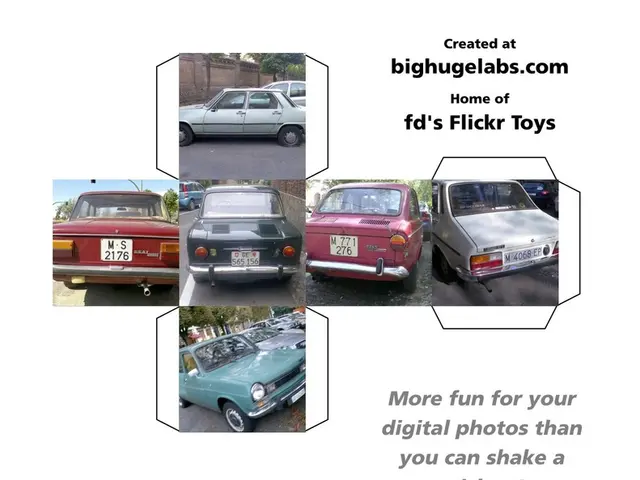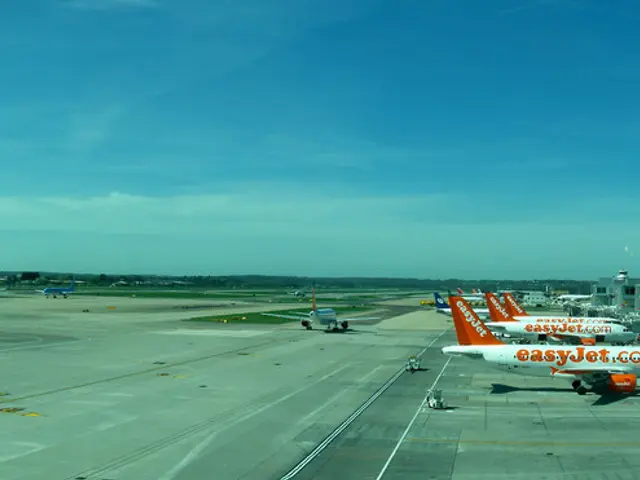A Highly Packed Situation: Germany's Motorways Struggling with Truck Overcrowding
Criticism brews over excessive vehicle congestion from auto association - Obstacles for Truck Accommodation
Informally speaking, Germany is facing a massive crunch when it comes to truck parking spaces on its motorways, causing a substantial headache for the Auto Club Europa (ACE). After conducting a 6-week inspection at rest areas, ACE flagged an alarming risk to traffic, particularly on the southern Berlin Ring (A10) and the A24 in Mecklenburg-Vorpommern. The culprit? Heavy goods vehicles parking haphazardly at these critical spots.
The ACE's investigation revealed some eye-opening numbers. For instance, the Eichelborn Nord rest area on the A4 in Thuringia saw a whopping 60% overcrowding, while the Galgenberg Nord rest area on the A38 didn't fare too well either, with a 58% overcrowding. However, the situation wasn't as dire at the Hermsdorfer Kreuz West.
Last year, the regional management of the federal motorway company described the utilization of these facilities as "very high," particularly on the A4 and A38, with the Thuringian regional association of the transport industry insisting on the necessity of creating more truck parking spaces on motorways.
ACE's Red Alert: Overwhelming Overcrowding in Eastern Germany
Although ACE's count is a snapshot, it highlighted a mind-boggling overcrowding at 31 rest areas in eastern German states. A total of 2,168 parked trucks were spotted, with an estimated 50% overcrowding, considering only 1,412 spaces were available at these rest areas. In fact, 21 of the 31 inspected rest areas were found to have traffic hazards, especially during nighttime, with trucks parking in the entrance and exit lanes.
The striking truth? According to a 2023 survey by the Federal Highway Research Institute, there's a nationwide shortage of over 19,500 regular truck parking spaces on motorways. The Federal Association of Goods Transport, Logistics, and Disposal makes the issue even more dire, suggesting a whopper of a shortage—around 40,000 spaces. However, around 3,000 spaces were added between 2018 and 2023, according to the Federal Ministry of Transport.
- Overcrowding
- Traffic
- Rest Area
- Auto Club
- ACE
- Germany
- Truck
- Auto Club Europa
- Thuringia
- Eastern Germany
Behind the Scene: The Real Reasons for the Shortage
- Inadequate Parking Spaces: Germany is charging up against a substantial deficit, ranging from 19,500 to 31,000 parking spaces, due to factors like the snail's pace of new parking lot construction, averaging about 1,500 new spaces per year.
- Inefficient Use of Space: Existing parking facilities aren't making the most of their space. The Federal Ministry of Transport and Digital Infrastructure (BMVI) is exploring solutions like "compact parking," but this tech is still in the testing phase and not widely implemented.
- Future Charging Infrastructure Demand: The upcoming need for electric vehicle charging infrastructure will add to the strain on already limited facilities, particularly with charging technologies like the Megawatt Charging System requiring large areas to accommodate multiple trucks.
The Bottom Line: Consequences of the Shortage
- Safety and Comfort: The lack of parking spaces is forcing drivers to park in dangerous spots, leading to accidents and disrupting traffic flow, as well as affecting driver rest and safety regulations compliance.
- Traffic Congestion: When trucks are parked in inappropriate locations, it leads to bottlenecks, resulting in increased congestion on motorways and longer travel times for all vehicles.
- Economic Impact: The shortage can hinder the efficiency of the logistics and transportation sector, potentially causing increased costs, reduced productivity, and affecting local businesses and economies by restricting parking options for drivers.
Moving Forward: Potential Solutions
- Increased Budget: The German government will spend €400 million over four years to address the shortage directly.
- Alternative Locations: Suggestions like developing autohofs (service stations) outside of motorways are being proposed, since they are estimated to be cheaper and more efficient.
- Innovative Technologies: The integration of advanced charging technology could provide an exciting solution, transforming parked trucks into energy storage units, potentially reducing the need for separate parking spaces while creating more space for charging infrastructure.
- The overwhelming overcrowding at 31 rest areas in eastern Germany, as highlighted by the Auto Club Europa (ACE), has prompted concerns about industry regulations and employment policy, particularly those related to the transportation sector, as the shortage of truck parking spaces on motorways persists, with a nationwide deficit of over 19,500 regular spaces.
- Implementing innovative technologies, such as compact parking systems, and integrating advanced charging technology, could potentially revolutionize the employment policy in the transportation industry, creating new opportunities while addressing the urgent need for more truck parking spaces on motorways.








